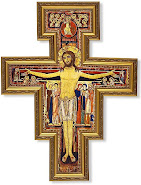By Whose Authority? (Part II)
In order to deal with the issue of authority, we must make sure that we are clear on something. Often times our Protestant brethren make the argument regarding authority out to be Church vs. Scripture. This is a false dichotomy. It isn't an either/or argument...it is a both/and argument.
Catholics do believe that scripture is materially sufficient in matters of faith and morals, we just don’t believe that it is formally sufficient. What is the difference? The difference between formal and material sufficiency is the difference between having a brick house and having a big enough pile of bricks to build a house. Drawing on this analogy, Christ is the builder and he uses the mortar of Tradition and the trowel of the Magisterium to build His brick house of revelation from a mere pile of bricks (Mt. 16:18, Eph. 2:19-22; 1 Tim. 3:15). It is these three elements together -- written Tradition (that is, Scripture), unwritten Tradition, and the Magisterium -- that hand down the fullness of revelation, who is Jesus Christ. [1]
Many protestants will say that sola scriptura has its safeguards to prevent them from falling into doctrinal error; they believe in having good hermeneutical (how to apply the text) principles by which one must base his understanding of scripture (ie. using clear texts to interpret unclear, interpreting the New Testament in light of the Old, etc.) We can agree to this as well. However, how do we determine the difference between a “clear text” and an “unclear text?” Is a text clear because one understands it, or is it because one thinks he understands it? If we take the sentence: “I never said you stole money”, we can emphasize different words in the sentence and arrive at vastly different meanings. The sentence is pretty simple, yet we can misinterpret it very easily. It is much easier to hold a face to face converstion with someone than it is to write letters. Why? Because we could hear inflection and read body language. As it is, we are merely reading the written word.
We also must recognize that biblical interpretation is more than just good exegesis (interpreting a text on the basis of the text itself). Biblical scholarship can very easily be reduced to merely dissecting a corpse. We must look at the genre of the book as well as the four senses of scripture: literal, anagogical, allegorical and moral. We should then put ourselves in the historical context of the audience for which it was written. In the case of the NT, that would be first century Jews. First century Jews had a covenantal world view that we don’t really understand. Now if SS is to be adhered to, how does the average person do this? Some of us have the advantage of being well educated. Many of us have the resources available to do in depth personal study? How can one interpret the bible if they have no Bible and even if they did, they couldn’t read it? The only access to scripture that may people have had in previous generations is what they heard in church. If you look at the patristic sources, they were trying to determine the canon so that they would have a list of books that were suitable for being read in church. The context of scripture is the liturgy. In the account of the disciples on the way to Emmaus, the Scriptures came alive for the disciples after Jesus took, blessed, broke and gave bread with them. Is that a coincidence that these are the same words used at the last supper? These are the same words we hear every time we attend Mass. We read the Word of God, then we commune (literally) with the Word of God. As Scott Hahn has said many times, "a protestant studies the menu while the Catholic or Orthodox enjoys the meal."
I recently read the question: “Why is there a need for scripture and the Church…why not one or the other?” Well, why do we have textbooks and teachers? Why do we have the constitution as well as the Court? Why do companies have business plans and boards? Why does baseball have umpires? Why do we have the phrase, “that isn’t what I meant?” There will always be a need to clear up confusion.
[1]http://cuf.org/faithfacts/details_view.asp?ffID=133)








